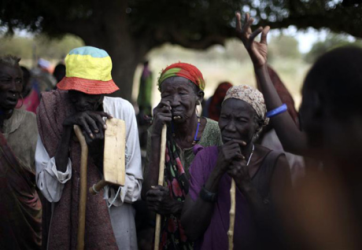Jonglei: two people killed in raid on Anyidi village
October 12, 2012 (BOR) – Two people were reported killed by suspected Murle raiders in Anyidi village in Jonglei’s Bor on Friday.

The cattle were then confiscated from the raiders by South Sudan army (SPLA) peace and restoration forces member of parliament representing Bor, Philip Thon Nyok, told Sudan Tribune on Friday.
“Murle criminals killed two people at Thian-wei”, said Nyok.
Wech Ayom Jok and Wall Gai Ayuel, both in their forties, were killed while herding their cattle not far from the village, according to Nyok.
One of the youth leaders in Anyidi, Thon Kur, told Sudan Tribune that the local government had been “too slow to respond to our complaints,” that the disarmament in the Bor area had been unequal – with the Murle being less diassarmed than the other ethnic groups.
Kur did not explain what would motivate the government to offer the Murle preferential treatment.
He also claimed that 60 cattle have been looted from Anyidi since September, “and nothing was done by the same government we are under.”
Nyok said he had informed the UN Mission in South Sudan to move with him to the village to see the bodies before burial on 13 October.
Attempts to reach the commissioners of both Bor and Pibor were unsuccessful to a bad phone connection.
The long-running tribal conflict in the region has resulted in widespread displacement of its citizens.
There has been scant information from the Murle Diaspora and the Murle in South Sudan on their perspective of the conflict, unlike the vocal Luo-Nuer who claim that the Murle have been driven to abducting their children as they are suffering from an infertility endemic; a view shared by Kiir.
According to the UN Environmental Program the Murle were in Ethiopia until the 19th century. Some remained their until the 1990s while others were driven west by local Nilotes. They established an homeland in Pibor county, Jonglei state in the 1930s, since which, environmental pressures have impinged upon their pastoralist lifestyle.
Little evidence can be found to support the infertility claim. However, the motivation to rationalise the denigration of one of South Sudan’s pariah ethnic groups, in order to legitimise the attribution of blame, is self-evident.
The notable Murle rebel leader, David Yau Yau, signed a peace deal with Juba government in June 2011. However, there are allegations that Yau Yau is involved in the current Jonglei insecurity which has led to the Médecins Sans Frontières humanitarian organisation evacuating the area.
In March, the president of South Sudan, Salva Kiir ordered the comprehensive disarmament in Jonglei in all the counties to eliminate illegal guns in the hands of civilians.
In April, the president appointed 23-member peace commission, under the leadership of Archbishop Daniel Deng Bul, to initiate peace talk in Bor that would bring all the six tribes of Dinka Bor, Nuer, Murle, Anuak, Jie and Kachipo.
In May a peace was signed by traditional leaders of the six tribes, with the recommendations that all abducted children should be returned to their families.
(ST)
